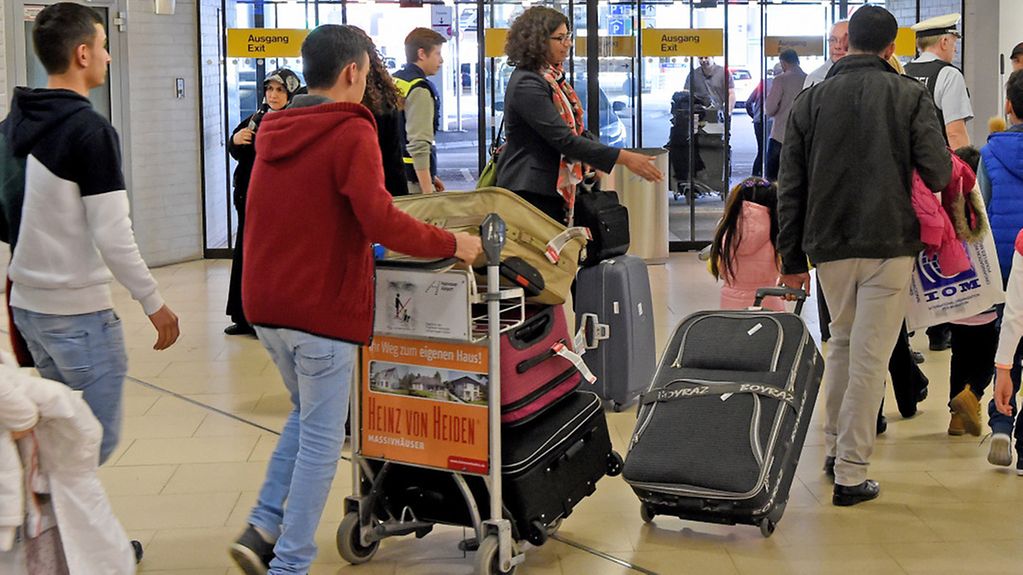EU-Turkey Agreement
Monday saw the start of the implementation of the EU-Turkey Agreement. Refugees arriving illegally in Greece will be returned to Turkey. In return, the EU will admit refugees fleeing Syria’s civil war directly from Turkey.
4 min reading time

Thirty-two Syrian refugees arrived on Monday at Hannover Airport, the first to arrive legally from Turkey
Photo: picture-alliance/dpa/Holger Hollemann
The first refugees have arrived in Germany: 32 Syrians have landed in Hannover.
Greece has returned 202 refugees arriving illegally on the Greek islands. Parallel to this, the first Syrian refugees from Turkey arrived in Germany on Monday 4 April. This marks the start of implementation of the EU-Turkey Agreement concluded on 18 March.
Most refugees come to Europe via Turkey, making Turkey an important partner in efforts to resolve the refugee situation. The EU-Turkey Agreement aims to destroy the business model of human traffickers, while also easing the burden of this partner country and strengthening relations between the EU and Turkey.
Refugees arriving in Greece (as of 20 March) will be returned to Turkey with immediate effect. For every refugee arriving illegally in Greece and returned to Turkey, the EU will admit another refugee fleeing the Syrian civil war. This "resettlement procedure" is thus also known as the 1:1 scheme.
Germany is to admit 1,600 refugees. This is Germany’s quota under the relocation directive agreed by the EU last July. Other EU states too are now awaiting the arrival of the first Syrian refugees from Turkey.
First Syrian families land in Hannover
The first 32 Syrian refugees have now arrived legally in Germany. They are families with children, reported Tobias Plate, spokesperson of the Federal Ministry of the Interior, on Monday. One of the most important admission criteria is to keep families together, but the level of vulnerability and ability to integrate also play an important role. Other factors include language skills, and schooling and vocational training.
The proposals for admission are submitted by Turkey’s migration authorities to the UN refugee agency, UNHCR, which reviews them. Refugees will only be permitted to enter Germany and other EU member states following an identity and security check. They will undergo a health check before they leave Turkey, with a special focus on ensuring that they are fit to fly.
Once the quota of 1,600 refugees has been exhausted, another 13,500 places are available if needed under existing commitments. The number of illegal refugees is, however, expected to drop sharply, once it is clear that these people have no prospects of being allowed to stay in the EU.
German staff help on the front line
Germany has pledged to provide staff to support the European Asylum Support Office (EASO) in Greece. The Federal Office for Migration and Refugees (BAMF) has offered EASO a total of 100 staff members for operations in Greece. Most of this number are decision-makers and staff members of the asylum procedures secretariat, including some who speak Arabic and Greek.
The first 30 German police officers are already in Greece. By the end of the week, all 100 police officers pledged should have arrived in Greece. The President of the Federal Agency for Technical Relief (THW) Albrecht Broemme is already there in his role as "special representative of the German government for the implementation of the EU-Turkey statement on migration".
No compromises on refugees’ rights
Refugees will be returned "in full accordance with European and international law", said federal government spokesperson Steffen Seibert. He pointed to a telephone conversation between the Chancellor and the Turkish Prime Minister on Sunday 3 April. At a forum on European asylum and refugee policy this was also underlined by the President of the European Parliament, Martin Schulz. "There will be no concessions to Turkey on key issues, not on media freedom and not on the protection of minorities," he said.
An overview of the Agreement concluded by the EU and Turkey on 18 March 2016
• The business model of human traffickers in the Aegean is to be destroyed and irregular migration from Turkey to the European Union sustainably reduced.
• All irregular refugees arriving in Greece as of 20 March will be returned swiftly to Turkey.
• In return, the EU will admit one refugee fleeing the Syrian civil war for every illegal Syrian refugee returned to Turkey (also known as the 1:1 scheme).
• Turkey will work with the EU to improve humanitarian conditions for Syrians. Turkey will receive six billion euros by 2018 for concrete refugee projects, for instance to enable children to attend school and to improve health care.
• Logistical and human resources support for Greece, including interpreters and border management staff, as well as support to help Greece care for the refugees in Idomeni will be provided through the emergency aid programme.
• Visa requirements for Turkish citizens will be lifted by the end of June 2016, provided Turkey has met all benchmarks by that date.
• Negotiations about Turkey’s accession to the EU will be accelerated and continued as part of an open-ended process.